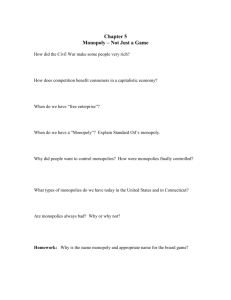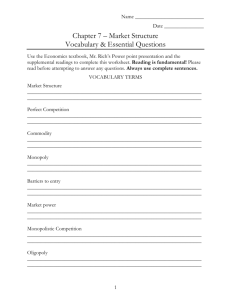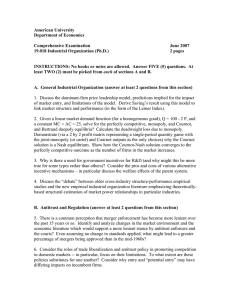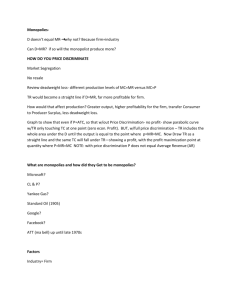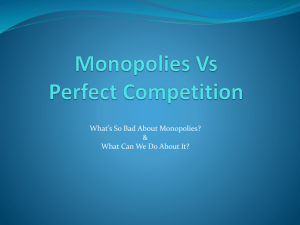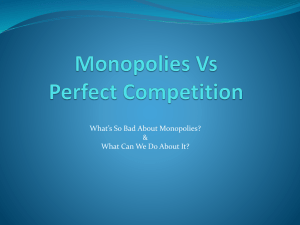How does government encourage or increase competition among businesses?
advertisement
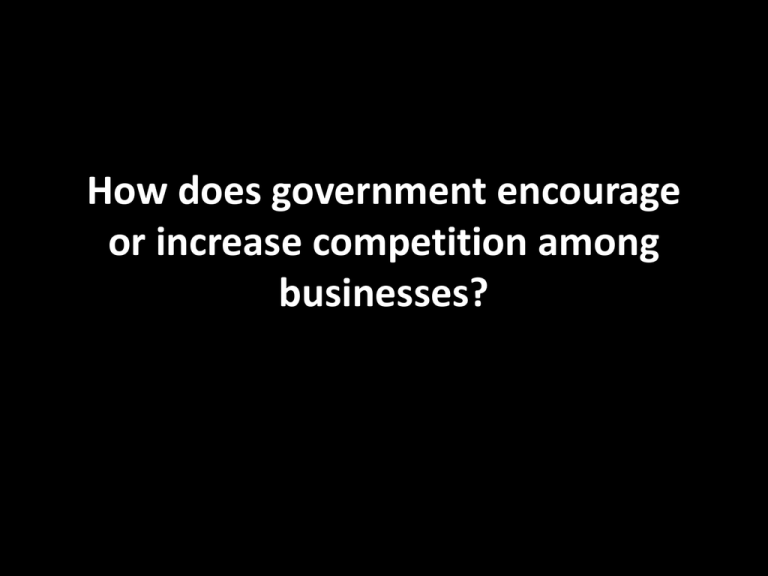
How does government encourage or increase competition among businesses? What is the goal of the game Monopoly? Monopoly • A monopoly is the sole provider of a good or service. • In a market, multiple businesses compete with multiple consumers to set the market price. With a monopoly, consumers suffer because they are forced to pay whatever price the monopoly sets. They don’t have the option to shop somewhere else. • One of the goals of the U.S. government is to encourage fair competition in the market place. Antitrust Laws • A trust is a group of businesses that threaten competition. Antitrust Laws • In 1890, the Sherman Antitrust Act banned businesses that prevented competition. • In 1911 the government broke up the Standard Oil Company. • In 1914 the Clayton Antitrust Act expanded the law to include unfair business practices. (i.e. a person cannot be on the board of directors for two competing companies) Mergers A merger is where two or more companies combine to form a single business. This may violate antitrust laws, and could be blocked by the government The Federal Trade Commission (FTC) enforces these laws. Natural Monopolies Sometimes it is cheaper and easier to let one company produce a good or service (i.e. building power lines for an expanding city). Government may allow this, but will regulate price changes and other business practices. Sometimes governments take over these natural monopolies and run them themselves (i.e. basic services like water and sewer). Natural Monopolies When government decides to end natural monopolies, it is called deregulation. How does government regulate business? The U.S. government has set many business regulations in place to protect employees' rights, protect the environment and hold corporations accountable for the amount of power they have in this business-driven society. Some of these regulations stand out more significantly than the others because of their relevance to every U.S. employee and consumer. Advertising Laws pertaining to marketing and advertising set in motion by the Federal Trade Commission (FTC) exist to protect consumers and keep companies honest about their products. Every business in the country is required to comply with the truth-in-advertising laws and could face lawsuits for violation. Advertising • Truth-in-advertising laws are made up of dozens of tidbits under three main requirements: • - advertising in the United States must be truthful and non-misleading; • - businesses need to be able to back up claims made in advertisements at any time; • - and advertisements must be fair to competitors and consumers. Advertising Additionally, in compliance with the Fair Packaging and Labeling Act of 1966, all product labels must include information about the product, such as nutrition, size, and distribution and manufacturing information. Employment and Labor Among the ever-changing regulations in business are employment laws. These laws pertain to minimum wages, benefits, safety and health compliance, work for non-U.S. citizens, working conditions, equal opportunity employment, and privacy regulations--and cover the largest area of subjects of all the business regulations. Employment and Labor The Fair Labor Standards Act, applied by the Wage and Hour Division, set the minimum wage for workers in the United States. There are also several required benefits, including unemployment insurance, Workers' Compensation Insurance and employee Social Security assistance. Employment and Labor The Immigration and Nationality Act works to ensure that only U.S. citizens and individuals with work visas can be hired, and every business must keep on file I-9 eligibility forms for applicable employees. Environmental The Environmental Protection Agency (EPA) enforces environmental laws passed by the federal government through educational resources, frequent inspections and local agency accountability. The Environmental Compliance Assistance Guide exists to help businesses--small and large alike--achieve environmental compliance, and serves as an educational resource more than an enforcer. Privacy Sensitive information is usually collected from employees and customers during hiring and business transactions, and privacy laws prevent businesses from disclosing this information freely. Information collected can include social security number, address, name, health conditions, credit card and bank numbers and personal history. Privacy Not only do various laws exist to keep businesses from spreading this information, but people can sue companies for disclosing sensitive information. Safety and Health The Safety and Health Act of 1970 ensures that employers provide safe and sanitary work environments through frequent inspections and a grading scale. A company must meet specific standards in order to stay in business. These regulations have changed frequently throughout the years alongside the changing sanitary and workplace standards. In accordance with the 1970 act, employers must provide hazard-free workplaces, avoiding employee physical harm and death, through a number of procedures. Organizations that Protect the Health and Safety of the Public The Food and Drug Administration (FDA) ensures that food and drugs that people buy are safe for consumption. Organizations that Protect the Health and Safety of the Public The Center for Disease Control (CDC) works to reduce the spread of diseases. Organizations that Protect the Health and Safety of the Public The Consumer Product Safety Commission (CPSC) protects consumers from injury. If they feel a product is unsafe, they may recall the item. Organizations that Protect the Health and Safety of the Public The Occupational Safety and Health Administration (OSHA) sets strict guidelines that businesses must follow to keep their employees safe. Regulating private business can be difficult because it can cost business a lot of money. For example, if something is recalled, a business must pay to remove or fix all the items in circulation, or complying with safety regulations can be costly.
